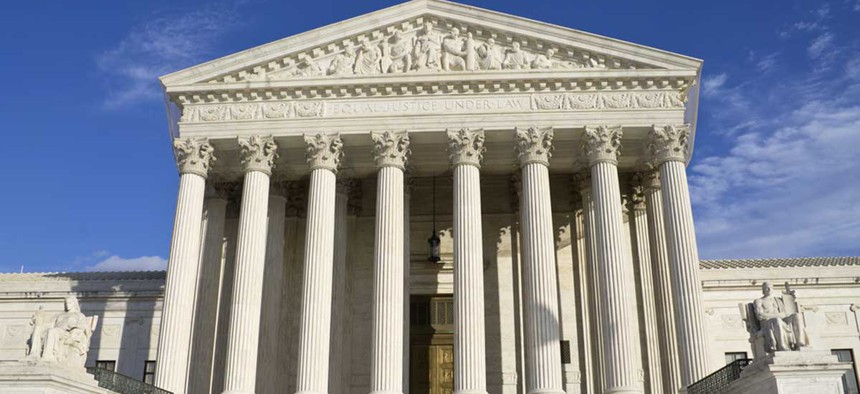
mdgn/Shutterstock.com
At Supreme Court, Ominous Signs for Public-Sector Unions
The justices seemed likely to rule that certain union fees violate the First Amendment.
The Supreme Court signaled Monday that it’s prepared to deal a major blow to public-sector unions—and may overturn one of its own precedents in the process.
Most of the justices seemed to believe that public-sector employees who don’t join a union should not have to pay fees that support the union’s negotiations. Those “agency fees,” from the unions’ perspective, are aimed at free riders—employees who benefit from the contracts unions negotiate without paying the dues that make those negotiations possible.
The Supreme Court signed off on those fees in 1977, but it has been chipping away at that ruling recently and now might be ready to overturn it altogether. And things looked decidedly bleak for unions at the Supreme Court on Monday, when the justices heard oral arguments in a lawsuit fled by a California teacher who isn’t a member of the teachers’ union and does not want to help pay for its advocacy activities.
“The union, basically, is making these teachers compelled riders,” Justice Anthony Kennedy said Monday.
Rebecca Friedrichs, the plaintiff in Monday’s case, says agency fees violated her First Amendment by forcing her—and other nonunionized employees—to subsidize the union’s political advocacy.
If the high court agrees, its ruling would be an enormous loss for public-sector unions, cutting off a significant funding stream as they face increasingly aggressive criticism from conservatives at the state level.
Twenty-three states allow public-sector unions to collect agency fees. Nonmembers can’t be forced to pay for unions’ expressly political activities; their fees are only supposed to fund collective bargaining.
But in the public sector, critics argue, it’s hard to draw the line between a collective-bargaining issue and a political one. For example, Kennedy said, teachers’ unions’ advocacy against merit pay is a workforce issue, but also a public-policy question, and individual teachers might disagree with the unions. Perhaps that’s why they’re not members.
“What is bargained for is, in all cases, a matter of public interest,” Justice Antonin Scalia said Monday.
David Frederick, the attorney representing the unions, argued that their contracts cover a host of apolitical workplace issues, such as lunch breaks and start times, not just contentious ones such as merit pay and performance standards.
“I suppose if that’s so convincing, the union can persuade teachers to join the union,” Kennedy replied.
The Supreme Court upheld public-sector agency fees in 1977 in Abood v. Detroit Board of Education. And the Court’s liberal justices argued strenuously Monday that the Court should not overturn that precedent—a step the Court rarely takes, and which usually requires it to find a grave error in its original ruling.
“You start overturning things, what happens to the country viewing us as a sort of stability?” Justice Stephen Breyer asked.
But if those concerns piqued Kennedy’s interest, he didn’t show it. Kennedy, the Court’s swing vote, spent significantly more time Monday on the challengers’ First Amendment argument, suggesting repeatedly that public-sector bargaining agreements are different—and more political—than standard employment negotiations.
(Image via mdgn/Shutterstock.com)






